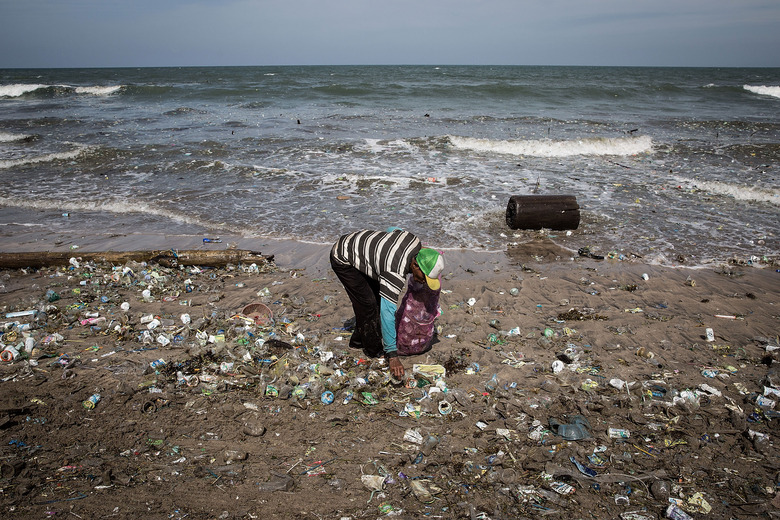How To Clean A Beach
Oceans and lakes are the end of watersheds — areas surrounding any body of water divided by hills. They therefore collect all of the trash that flows from the rivers feeding them, as well as any trash left behind on beaches or within their own water.
Trash is a growing problem that harms beaches and compromises recreation, tourism, and important marine habitat for animals and plants.
It's time for community organizing to start cleaning beaches to help these ecosystems thrive.
Organize the Cleanup
Step 1
Choose your beach.
Find one that has access to parking and is easy to traverse for all volunteers. Know your crew — do they want a challenge with a beach covered in litter, or are they beginners who need an easy beach walk with the occasional scrap of trash to toss into their recycling bag?
Step 2
Get permission and collect gear.
Contact your local government for permission to access the beach, if necessary. Some locals may require permits. Contact local landfills to see if they can donate your tipping fees as well as trash and recycling bags.
Also, be sure to get in touch with the Ocean Conservancy for tips — they would appreciate any and all data you can supply about your event.
Step 3
Get the word out.
Send out press releases to local papers and radio stations. Put up flyers and post to social media outlets. Invite everyone you know to clean up your chosen beach. Be sure to also invite waterside neighbors.
During the Event
Step 1
Organize your volunteers.
Set up a check-in station for volunteers to sign in and collect supplies. Display a map to delineate your chosen cleaning location. You may be required to have them sign liability wavers.
Many will request volunteer hours validation, such as high school students participating in service learning classes. Be sure to offer sun screen, drinks, and goodies like t-shirts or other swag. Set a completion time and place for volunteers to meet at the end of the event.
Step 2
Collect the trash.
Instruct volunteers to always either wear gloves or use litter grabbers/trash reachers. Separate trash from recycling as it is collected. Leave any driftwood, shells or sea glass in place. You may also opt to rake especially dirty sections of beach.
Step 3
Remember: safety first.
Have a plan for hazardous materials, dead or entangled animals, and broken glass or other sharp objects. This may vary depending on your municipalities and specific shoreline.
Tell volunteers to ensure fire pits are cool before touching. Educate them about possible poisonous plants or animals they may encounter. Also, be sure minors are supervised by adults at all times. Have first-aid kits on hand and directions to the nearest hospital — better safe than sorry!
Step 4
Once the cleanup has concluded, take down your displays and tables and collect the trash.
Document your litter — weigh it and make note of any surprising or interesting finds. Drop off your trash at your previously designated spot — a landfill or nearby dumpster. Do the same with your recycling. Make sure that your crew has left nothing behind.
Things Needed
- Trash and recycling bags
- Gloves and/or litter grabbers
- Flyers
- Possibly permits
- Folding table, paper, pens
TL;DR (Too Long; Didn't Read)
Thank and acknowledge volunteers as often as possible with personal thank you notes and through social media.
Share your results widely through social media, radio and print contacts, and the Ocean Conservancy if doing a sea shore cleanup.
Educate your volunteers and the media about watersheds and the negative effects of trash as you tell them about your event.
Warning
Have a solid plan for hazardous or dangerous items found on the beach, such as needles, weapons or dead animals. Tell minors to summon an adult if they find such things.
Pick up sharp objects with gloves and keep them in a separate, secure container to turn in with medical waste at a hospital. Turn in weapons to the authorities. Alert your local animal protection agency of any dead or hurt animals.
Cite This Article
MLA
Wise, Maureen. "How To Clean A Beach" sciencing.com, https://www.sciencing.com/clean-beach-2311009/. 22 May 2019.
APA
Wise, Maureen. (2019, May 22). How To Clean A Beach. sciencing.com. Retrieved from https://www.sciencing.com/clean-beach-2311009/
Chicago
Wise, Maureen. How To Clean A Beach last modified March 24, 2022. https://www.sciencing.com/clean-beach-2311009/
